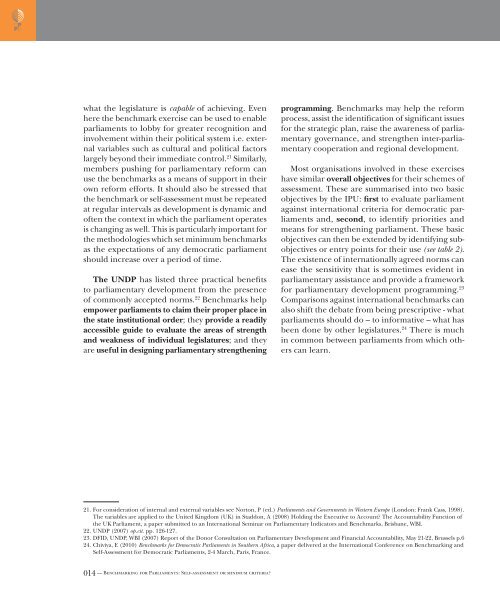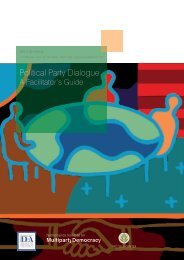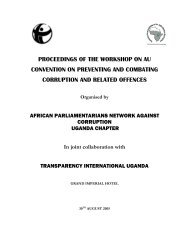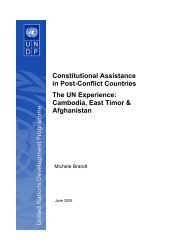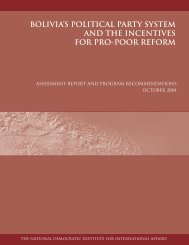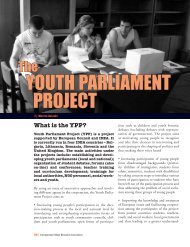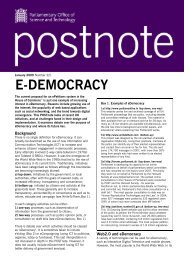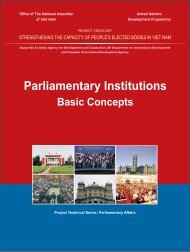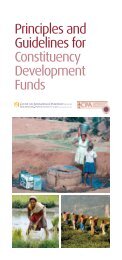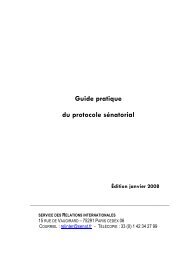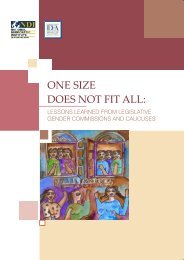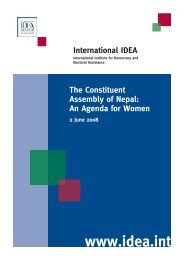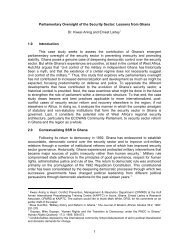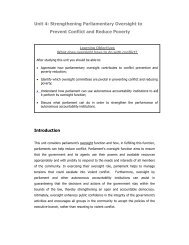BENCHMARKING FOR PARLIAMENTS
BENCHMARKING FOR PARLIAMENTS
BENCHMARKING FOR PARLIAMENTS
- No tags were found...
Create successful ePaper yourself
Turn your PDF publications into a flip-book with our unique Google optimized e-Paper software.
what the legislature is capable of achieving. Evenhere the benchmark exercise can be used to enableparliaments to lobby for greater recognition andinvolvement within their political system i.e. externalvariables such as cultural and political factorslargely beyond their immediate control. 21 Similarly,members pushing for parliamentary reform canuse the benchmarks as a means of support in theirown reform efforts. It should also be stressed thatthe benchmark or self-assessment must be repeatedat regular intervals as development is dynamic andoften the context in which the parliament operatesis changing as well. This is particularly important forthe methodologies which set minimum benchmarksas the expectations of any democratic parliamentshould increase over a period of time.The UNDP has listed three practical benefitsto parliamentary development from the presenceof commonly accepted norms. 22 Benchmarks helpempower parliaments to claim their proper place inthe state institutional order; they provide a readilyaccessible guide to evaluate the areas of strengthand weakness of individual legislatures; and theyare useful in designing parliamentary strengtheningprogramming. Benchmarks may help the reformprocess, assist the identification of significant issuesfor the strategic plan, raise the awareness of parliamentarygovernance, and strengthen inter-parliamentarycooperation and regional development.Most organisations involved in these exerciseshave similar overall objectives for their schemes ofassessment. These are summarised into two basicobjectives by the IPU: first to evaluate parliamentagainst international criteria for democratic parliamentsand, second, to identify priorities andmeans for strengthening parliament. These basicobjectives can then be extended by identifying subobjectivesor entry points for their use (see table 2).The existence of internationally agreed norms canease the sensitivity that is sometimes evident inparliamentary assistance and provide a frameworkfor parliamentary development programming. 23Comparisons against international benchmarks canalso shift the debate from being prescriptive - whatparliaments should do – to informative – what hasbeen done by other legislatures. 24 There is muchin common between parliaments from which otherscan learn.21. For consideration of internal and external variables see Norton, P (ed.) Parliaments and Governments in Western Europe (London: Frank Cass, 1998).The variables are applied to the United Kingdom (UK) in Staddon, A (2008) Holding the Executive to Account? The Accountability Function ofthe UK Parliament, a paper submitted to an International Seminar on Parliamentary Indicators and Benchmarks, Brisbane, WBI.22. UNDP (2007) op.cit. pp. 126-127.23. DFID, UNDP, WBI (2007) Report of the Donor Consultation on Parliamentary Development and Financial Accountability, May 21-22, Brussels p.624. Chiviya, E (2010) Benchmarks for Democratic Parliaments in Southern Africa, a paper delivered at the International Conference on Benchmarking andSelf-Assessment for Democratic Parliaments, 2-4 March, Paris, France.014 — Benchmarking for Parliaments: Self-assessment or minimum criteria?


